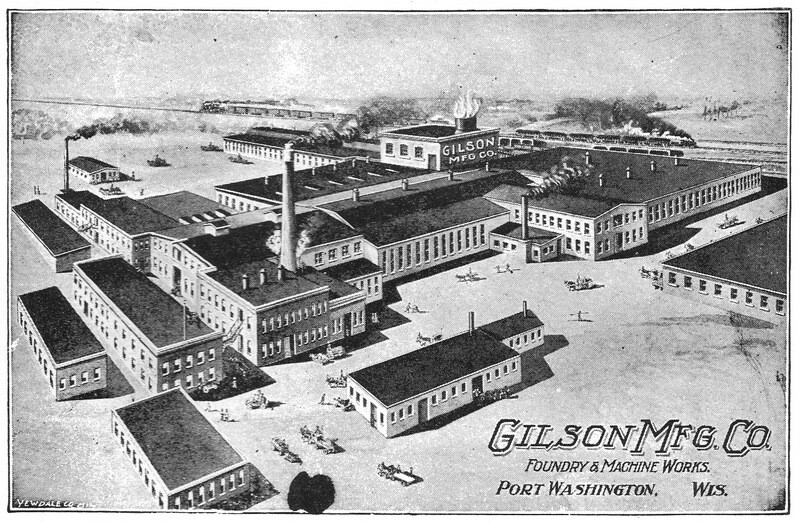
Image courtesy of Brian Szafranski
This company originated in 1855 as a foundry run by Theodore Gilson and John Maas. As best we can tell, their early products did not include anything for working wood: farm implements, cast iron pots, stoves, etc.
The Maas name disappears from the history quite early on. Theodore Gilson was succeeded by son John and grandson John E. Sometime before 1900 the company began making chair irons, which is the cast iron piece forming the base center of a swivel chair. The company became more involved in making office chairs and photography chairs; the latter had hidden headrests and handrests to allow the sitter to hold still for the long exposure times then needed. John Gilson and others received a series of patents for innovative improvements to office chairs that added various tilt and swivel features. The patent record suggests that although the Gilson company was not the first to produce these features, they did make key improvements to the mechanisms. In any event, the chairs were well received at a time when the typewriter was revolutionizing business operations.
Also beginning in the late 1800s the company began to manufacture gasoline engines. These free-standing engines were rapidly becoming popular, especially for farm use. At some point after introducing the engines, they began to manufacture an engine-powered drag saw.
We have seen a cast ashtray bearing the inscription "J. E. Gilson Co., foundry". J. E. Gilson was the grandson of the founder, and patent records suggest that the name "Gilson Manufacturing Co." was already in use by the time the grandson would have joined the business, so the J. E. Gilson Co. was perhaps the result of a split of the company into the foundry and manufacturing operations.
In 1907 a Canadian branch plant of Gilson Manufacturing Co. was opened in Guelph, Ontario, by Edward Barelman. The plant's first product was likely gasoline engines. Later on, the plant produced farm tractors, furnaces, home appliances, and refrigeration equipment. This plant survived until about 1977, when it was shut down.
In 1914 the Gilson family sold both the Port Washington and Guelph businesses. The Port Washington business was bought by longtime employee Harry W. Bolens. The Guelph operation was bought by a group of Canadian investors including Horace Mack, and named Gilson Manufacturing Co., Ltd. It manufactured stationary gas engines until about 1927.
In 1919 the U. S. company introduced what was reportedly the first powered garden tractor. In 1931 Bolens renamed the business to the Gilson-Bolens Manufacturing Co. We see the name Bolens Products Co. on a 1943 chair patent. In about 1946 the company was acquired by FMC Corp. In 1993 the Bolens Product Division was acquired by Garden Way Inc. (Troy-Bilt) and then was acquired in 2001 by by MTD Products Inc.
Information Sources
- A web page on the history of Gilson provides a good summary of the company history.
- From the Seventh Annual Cooperative Tractor Catalog, 1922, this firm is listed as a maker of "wood sawing machines".
- The Complete Guide to Stationary Gas Engines by Mark Meincke, 1996 page 100.
- A discussion on smokstak.com includes a picture of a Gilson "Dixie Ace" tractor, taken in Guelph in about 1919.
- Correspondent Bonnie M. Durtnall, who has a Guelph history web site, provided additional information about the Guelph business:
In 1916, the ownership changed. The American Gilson’s was purchased by Harry Bolens. He was not interested in the Canadian company. Instead, it was bought by a group of Canadian investors including Horace Mack. Horace Mack (1895-1959) was a Guelphite. He had started working for Gilson’s in 1911 at age-fifteen as an office boy. He parlayed hard work and determination into a career at the company, rising to become president when Edward Barelman who was president died in 1927. During this period, he had the support of several men including R.K. Dawson, Ferman and Stanley Koch and H. Cooper. Later Dawson was to become plant foreman and Dawson VP.